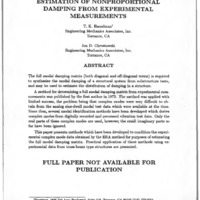-
Title
-
Estimation Of Nonproportional Damping From Experimental Measurements
-
Report Number
-
WL-TR-91-3078 Volume III, p. JAB-1
-
Creator
-
Hasselman, T. K.
-
Chrostowski, Jon D.
-
Corporate Author
-
Engineering Mechanics Associates, Inc.
-
Date
-
1991
-
Date Issued
-
1991-08
-
Extent
-
1
-
Identifier
-
ADA241313
-
Format
-
1 online resource
-
Abstract
-
The ftill modal damping matrix (both diagonal and off-diagonal terms) is required
to synthesize the modal damping of a structural system from substructure tests,
and may be used to estimate the distribution of damping in a structure.
A method for determining a full modal damping matrix from experimental measurements
was published by the first author in 1972. The method was applied with
limited success, the problem being that complex modes were very difficult to obtain
from the analog sine-dwell modal test data which were available at the time.
Since then, several modal identification methods have been developed which derive
complex modes from digitally recorded and processed vibration test data. Only the
real parts of these complex modes are used, however; the small imaginary parts so
far have been ignored.
This paper presents methods which have been developed to condition the experimental
complex mode data obtained by the ERA method for purposes of estimating
the full modal damping matrix. Practical application of these methods using experimental
data from truss-beam type structures are presented.
FULL PAPER NOT AVAILABLE FOR
PUBLICATION
-
Description
-
The ftill modal damping matrix (both diagonal and off-diagonal terms) is required
to synthesize the modal damping of a structural system from substructure tests,
and may be used to estimate the distribution of damping in a structure.
A method for determining a full modal damping matrix from experimental measurements
was published by the first author in 1972. The method was applied with
limited success, the problem being that complex modes were very difficult to obtain
from the analog sine-dwell modal test data which were available at the time.
Since then, several modal identification methods have been developed which derive
complex modes from digitally recorded and processed vibration test data. Only the
real parts of these complex modes are used, however; the small imaginary parts so
far have been ignored.
This paper presents methods which have been developed to condition the experimental
complex mode data obtained by the ERA method for purposes of estimating
the full modal damping matrix. Practical application of these methods using experimental
data from truss-beam type structures are presented.
FULL PAPER NOT AVAILABLE FOR
PUBLICATION
-
Distribution Classification
-
1
-
Distribution Conflict
-
No
-
DTIC Record Exists
-
No
-
Illinois Tech Related
-
No
-
Photo Quality
-
Not Needed
-
Report Availability
-
Full text available
-
Type
-
article
 articleJAB
articleJAB